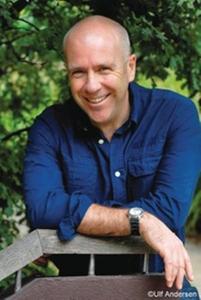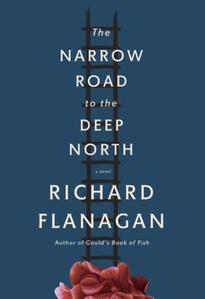
|
|
| photo: Ulj Anderson | |
Richard Flanagan was born in 1961 in Tasmania, where he lives still. His journalism has appeared in the New York Times, the New Yorker, Le Monde and The Daily Telegraph, and he is the author of six novels, including The Sound of One Hand Clapping (1997), Gould's Book of Fish: A Novel in Twelve Fish (2001) and Wanting (2008).
His newest novel, The Narrow Road to the Deep North (see our review below) is the story of Dorrigo Evans, an Australian Army colonel and surgeon captured by the Japanese during World War II and forced to work on the Burma-Thailand "Death Railway." The book was published last year in Australia, the U.K. and the Commonwealth to great critical acclaim. It was shortlisted for the 2014 Miles Franklin Literary Award--Australia's most prestigious literary prize--and has been longlisted for the 2014 Man Booker Prize.
This book is dedicated to your father, who was a prisoner of war during World War II. Is Dorrigo Evans based on your father?
Built in 1943 by 250,000 POW and Asian slaves of the Japanese through the then wilderness of Thailand and Burma, the Death Railway claimed 150,000 lives. More people died building that railway than there are words in my book.
My father was a very different man than Dorrigo Evans, but it was my father's experience as a POW on the Death Railway that shaped my life growing up. I am a child of the Death Railway; The Narrow Road to the Deep North is a soul history; and Dorrigo Evans is me.
You've written elsewhere that this book took you more than a decade to write and that it went through many forms. What made this process so difficult for you?
After he famously walked the tightrope between the Twin Towers in 1973, Philippe Petit was arrested. As he was about to be driven away in a police car, a journalist thrust his microphone in through the police car rear window and asked Petit why.
"There is no why," Petit replied.
There is no why as to why I wrote this book, nor why it took it so long, nor why it is the way it is.
It just is.

A novel of linked haiku. A haibun, a Japanese travel journal form combining poetry and prose. A family epic spanning a century and a vertiginous cast. A counterfactual history in which Japan occupies Australia. An Odyssean journey narrated in the first person plural by the POWs. All were burnt.
To be a writer is to be defeated by ever-greater things, but it is in the defeats that you discover all that matters. And I discovered my novel had to be a love story, and it had to be about hope.
For a great love story demonstrates the great truth about love: that we discover eternity in a moment that dies immediately after. And a war story because war is the great story of death. Death illuminates love; love and hope grant the futility of life meaning.
What was your research process like for The Narrow Road to the Deep North?
I lived. The rest is irrelevant detail.
Mostly I got up, sat down, and made it up. For the pleasure of writing is writing. If I wanted to work in research, I'd join the NSA.
Having said that, I did go to Japan and tracked down some men who had been guards on the Death Railway, including one--the Ivan the Terrible of my father's camp--who had been sentenced to death for war crimes, but whose sentence was later commuted. I met him in an office at a Tokyo taxi company. I asked him to slap me as the prison guards had the POWs, and as he did, the room began to shake and toss. A 7.3 Richter scale earthquake had hit Tokyo.
Realising realism never adequately conveys reality, I went back home, sat down, and started making it up again.
What works of art, fiction or otherwise, influenced the novel's construction?
Too many to mention, yet without them I am a compass with no north.
Why did you choose The Narrow Road to the Deep North as the novel's title? Did you decide to do this early on?
The haiku poet Basho's great book, the travel journal The Narrow Road to the Deep North (1689), is one of the high points of Japanese culture. The Death Railway is one of its low points. I wanted to use the forms and influences of Japanese literature, so beautiful, so profound, in the hope of divining, if only a little, a story so terrible, so inexplicable. I wanted to come to understand love and death, evil and goodness. And when I finished the novel, I realised I understood nothing.
You've called this "the book I had to write if I was to keep on writing." Now that you've completed it, what will you work on next?
Perhaps a novelist really only ever writes one book. Each new novel is just another chapter of that book, in search of one word that will finally divine and define their soul. And not knowing what that word is, they keep writing. And so too me. --Alex Mutter

